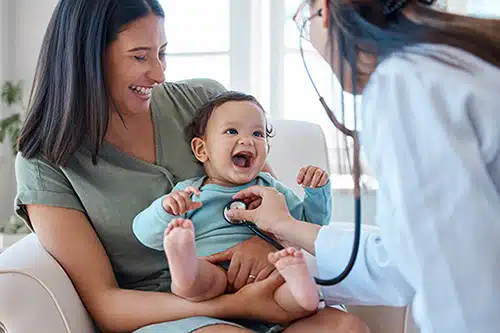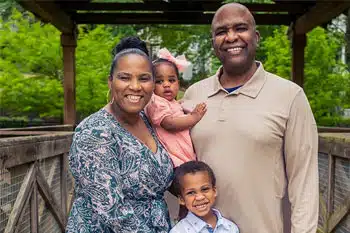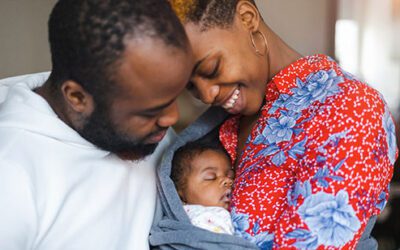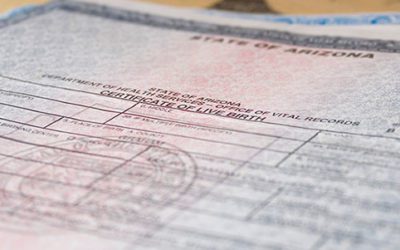
Many adoptive families have shared that the wait to be chosen by a birth mother is stressful. Lifetime Adoption encourages you to turn the waiting phase of your adoption journey into a constructive time.
Just as pregnant couples begin searching for a pediatrician months before their baby is born, adoptive couples should too. Choosing a pediatrician during your adoption wait checks one more item off your newborn “to-do” list now, and you won’t have to worry about it later!
Table of Contents
- Research and Find Candidates
- Screen Offices by Phone
- Schedule In-Person Visits
- Ask Questions
- Discuss Adoption
- Be Honest
- Address Potential Mental Health Issues
- Inquire About the Initial Health Examination
Research and Find Candidates
Ask around about pediatricians. Usually, good doctors are well-known, so find out what pediatrician your family, friends, co-workers, or neighbors use for their kids. The American Academy of Pediatrics keeps a list of board-certified pediatricians; simply use their Find a Pediatrician tool. You could also do some research online by searching for reviews of pediatricians on websites like RateMDs or Healthgrades.
Screen Offices by Phone
Call the pediatric offices you’re considering before scheduling in-person visits, to screen for basic requirements and narrow down your choices. Ask them if they have weekend hours—after all, children often get sick on a Friday, but it isn’t an obvious “get to the doctor now” sickness until Saturday morning. Additionally, consider the wait time for an appointment and whether the medical clinic accepts your health insurance.
Schedule In-Person Visits
To begin your final selection process, schedule a visit with a pediatrician so you can sit down and talk with them. It’s normal to do this, so don’t feel embarrassed or think it’s not necessary. You undoubtedly will want to find the best pediatrician for your baby that you can. You’ll be entrusting this doctor with your child’s care, after all.
When you meet in person, assess whether the doctor is a friendly “people person” and whether the office staff is helpful. The environment and the people you’ll be interacting with regularly matter just as much as the doctor’s credentials.
Ask Questions
Here are some questions you may want to ask them:
- What is your pediatric background? Do you have any experience with adopted children?
- How long have you been in practice?
- If you have a question, when is the best time to call? If the doctor is unavailable, who will handle your questions?
- What are their office hours? Are they available at any time?
- How long do check-ups usually last?
- How does your office handle emergencies?
- How quickly can you reach someone with urgent questions?
- Are you in a group practice? (if the pediatrician is in a solo practice, ask who covers when they are away.)
- Does the pediatrician offer virtual appointments for non-emergency questions?
- Do they use a patient portal for test results, appointment scheduling, etc.?
- How do they handle prescription refills?
- For transracial adoptions: Does the doctor have experience with different ethnicities?
Discuss Adoption
When you’re talking about adoption with the pediatrician, remember to be upbeat and positive. While it’s best to choose a pediatrician who has experience with adoption, it’s not always possible. If your child’s pediatrician does not have adoption experience, it gives you the opportunity to educate and help spread awareness about it.
Use positive terms like “placed” instead of “given up.” Many people still use adoption terms which are outdated and not negative. If your pediatrician continues to use this language, gently ask them to use more up-to-date words. Your positivity will rub off on your doctor, and this will improve your child’s experience at the doctor’s office.
Be Honest
Be up-front with your doctor about your child’s medical history. Make sure your pediatrician has all the information on your child’s health. If information is missing, let them know you don’t have the information. Don’t make guesses. If possible, try to get his or her birth mother’s pregnancy records. These could help the pediatrician understand any potential health risks for your child related to their genetics.
Speak openly and naturally about adoption with your pediatrician. When your pediatrician talks to your child, encourage them to discuss the topic openly. Since you’ll be talking about adoption a lot at home, your child should feel comfortable discussing it with the pediatrician.
Address Potential Mental Health Issues
Talk to your doctor about mental health issues your adopted child may experience due to their adoption. Ask them questions about their experience dealing with adopted kids who have struggled with things like:
- Identity issues
- Struggling to fit in
- Feeling sad about their adoption
- Feeling angry about their adoption
- Signs of grief
Even in the most loving and healthiest families, adopted children can struggle with feelings of loss or identity issues. They may act out as they come to terms with their adoption. It’s crucial that their pediatrician does not misdiagnose these behaviors.
Inquire About the Initial Health Examination
Since your baby will probably be born in another state or city, the pediatrician you choose will not likely be the first doctor to see your child. When you return home, ask your pediatrician when he/she would like to examine your baby and what information they may need about their birth.
Providing all the medical records you can, plus pregnancy records if they exist, is critical. There may be a lack of data on some of the medical information. So, be honest with your pediatrician about what you do or don’t know. They should be able to fill in the gaps by doing tests and a medical examination of your child.
The pediatrician will do a complete medical examination of your adopted baby or child to look for any undetected health issues. They should conduct blood and urine tests, review their medical records, and complete a physical examination. Then, the doctor can diagnose and treat any medical issues that they find.
Choosing a Pediatrician for Your Adopted Baby
Finding the right pediatrician is important, so ask questions and trust your instincts. Sometimes, even if a pediatrician isn’t very experienced, you may feel comfortable with them and feel they have the same philosophy regarding your child’s care. If your instinct tells you this pediatrician would do a good job, they may be just right for your child.
Working together, you should feel that your pediatrician is providing the best care possible. If you have questions about how to answer the doctor’s questions or discuss your child’s adoption with medical professionals, your Adoption Coordinator at Lifetime will be able to help.
Editor’s Note: This article was originally published on January 6, 2021, and has since been updated.
Founder of Lifetime Adoption, adoptive mom, adoption expert, and Certified Open Adoption Practitioner (C.O.A.P).
Since 1986, adoption expert Mardie Caldwell has been dedicated to bringing couples and birth parents together in order to fulfill their dreams.
“Many years ago, I was also searching for a child to adopt. We didn’t know where or how to get started. Through research, determination, and a prayer, our dream of a family became reality. I started with a plan, a notebook, assistance from a caring adoption consultant and a lot of hard work; this was my family I was building. We had a few heartaches along the way, but the pain of not having children was worse!
Within weeks we had three different birth mothers choose us. We were overwhelmed and delighted. Many unsettling events would take place before our adoption would be finalized, many months later. Little did I know that God was training and aligning me for the adoption work I now do today. It is my goal to share with our families the methods and plans which succeed and do not succeed. I believe adoption should be affordable and can be a wonderful “pregnancy” for the adoptive couple.
I have also been on both sides of infertility with the loss of seven pregnancies and then conceiving by new technology, giving birth to a healthy daughter. I have experienced first-hand the emotional pain of infertility and believe my experience allows me to serve your needs better.
It is my hope that for you, the prospective parents, your desire for a child will be fulfilled soon.”






0 Comments